Unit 10 You're supposed to shake hands. 知识点详解 复习课件(共37张PPT)
文档属性
| 名称 | Unit 10 You're supposed to shake hands. 知识点详解 复习课件(共37张PPT) | 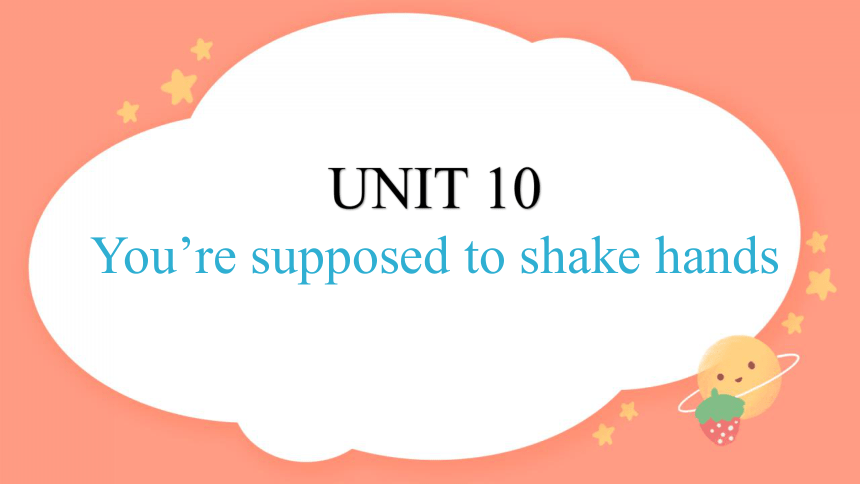 | |
| 格式 | pptx | ||
| 文件大小 | 1.7MB | ||
| 资源类型 | 教案 | ||
| 版本资源 | 人教新目标(Go for it)版 | ||
| 科目 | 英语 | ||
| 更新时间 | 2021-12-24 21:37:04 | ||
图片预览

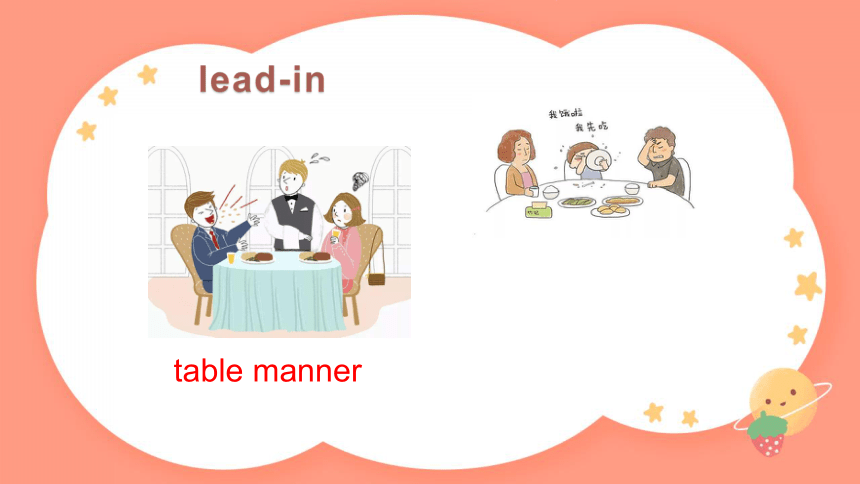

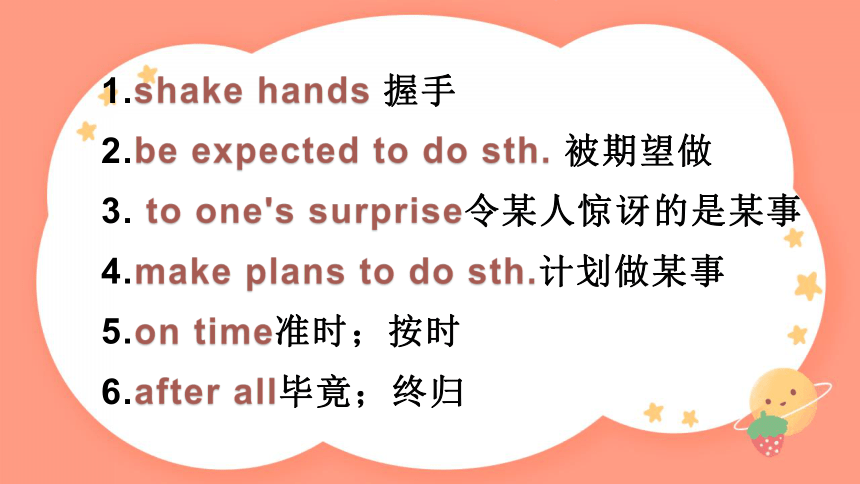
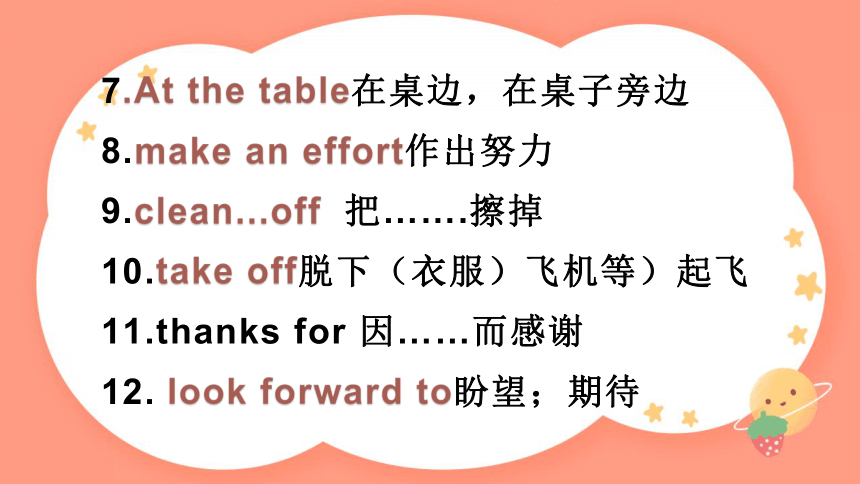

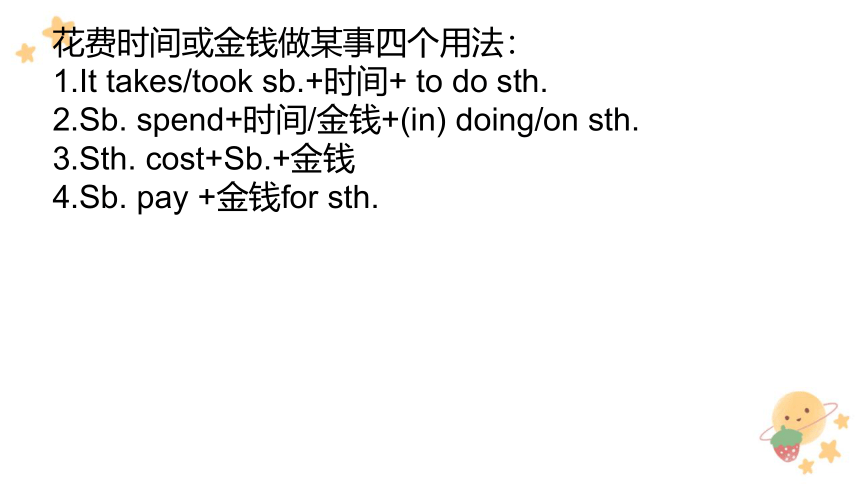
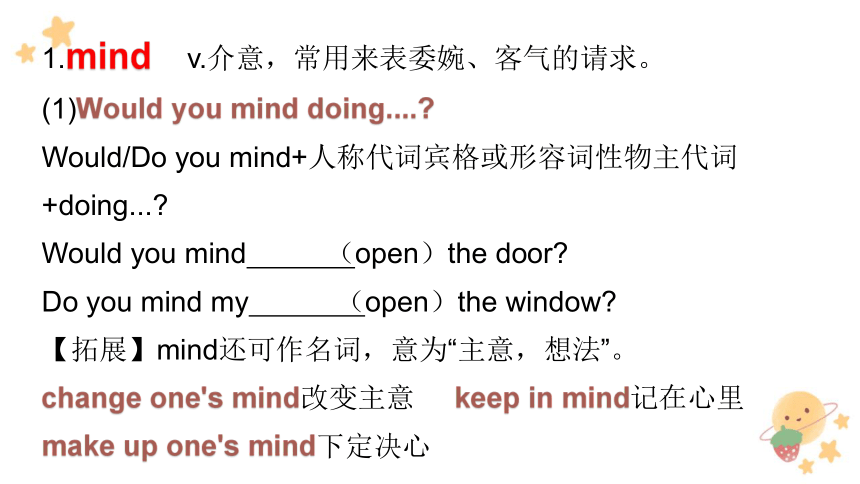
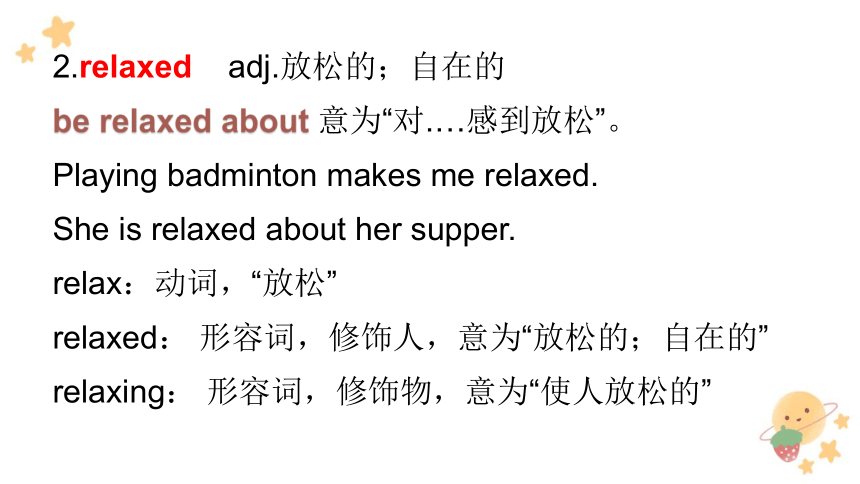
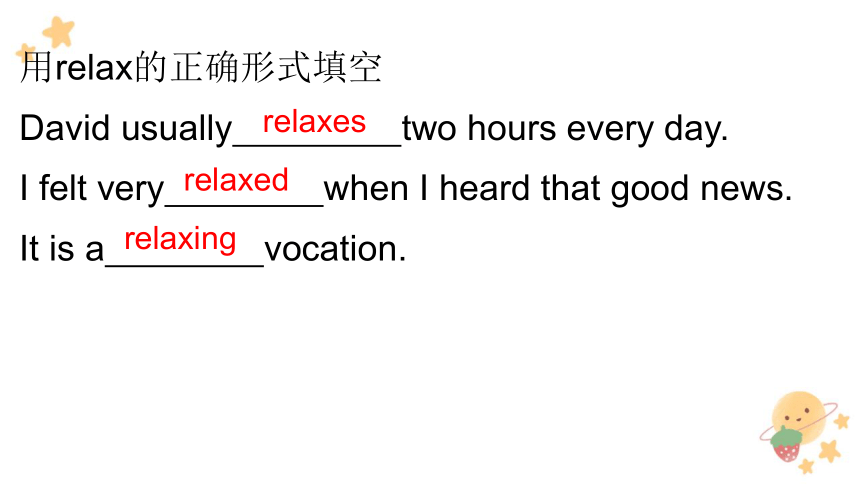
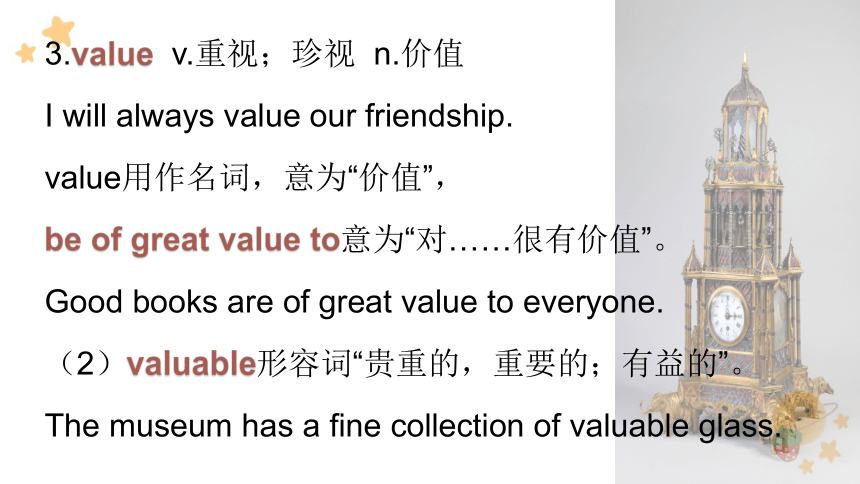
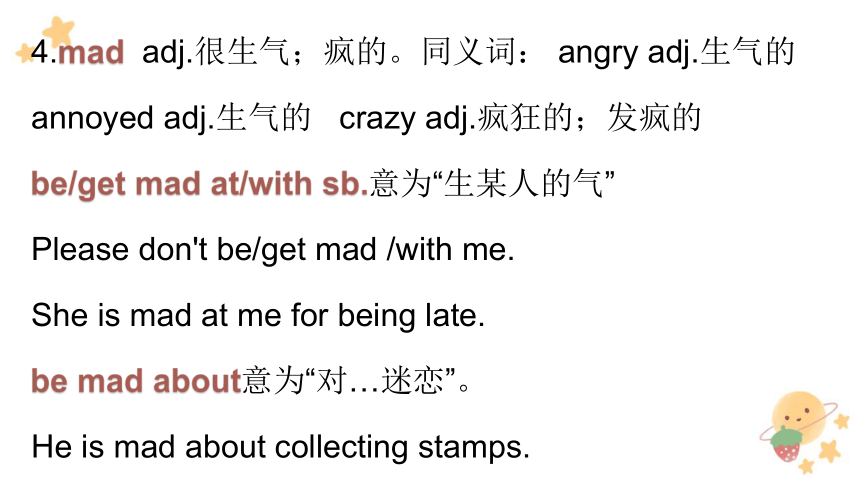
文档简介
(共37张PPT)
UNIT 10
You’re supposed to shake hands
lead-in
table manner
短语
1.shake hands 握手
2.be expected to do sth. 被期望做
3. to one's surprise令某人惊讶的是某事
4.make plans to do sth.计划做某事
5.on time准时;按时
6.after all毕竟;终归
7.At the table在桌边,在桌子旁边
8.make an effort作出努力
9.clean...off 把…….擦掉
10.take off脱下(衣服)飞机等)起飞
11.thanks for 因……而感谢
12. look forward to盼望;期待
知识点分析
花费时间或金钱做某事四个用法:
1.It takes/took sb.+时间+ to do sth.
2.Sb. spend+时间/金钱+(in) doing/on sth.
3.Sth. cost+Sb.+金钱
4.Sb. pay +金钱for sth.
1.mind v.介意,常用来表委婉、客气的请求。
(1)Would you mind doing....
Would/Do you mind+人称代词宾格或形容词性物主代词+doing...
Would you mind (open)the door
Do you mind my (open)the window
【拓展】mind还可作名词,意为“主意,想法”。
change one's mind改变主意 keep in mind记在心里
make up one's mind下定决心
2.relaxed adj.放松的;自在的
be relaxed about 意为“对.…感到放松”。
Playing badminton makes me relaxed.
She is relaxed about her supper.
relax:动词,“放松”
relaxed: 形容词,修饰人,意为“放松的;自在的”
relaxing: 形容词,修饰物,意为“使人放松的”
relaxes
relaxed
relaxing
用relax的正确形式填空
David usually two hours every day.
I felt very when I heard that good news.
It is a vocation.
3.value v.重视;珍视 n.价值
I will always value our friendship.
value用作名词,意为“价值”,
be of great value to意为“对……很有价值”。
Good books are of great value to everyone.
(2)valuable形容词“贵重的,重要的;有益的”。
The museum has a fine collection of valuable glass.
4.mad adj.很生气;疯的。同义词: angry adj.生气的
annoyed adj.生气的 crazy adj.疯狂的;发疯的
be/get mad at/with sb.意为“生某人的气”
Please don't be/get mad /with me.
She is mad at me for being late.
be mad about意为“对…迷恋”。
He is mad about collecting stamps.
5.knock v.敲;击 n.敲击声;敲击,后接介词at/on。
The boy knocked at/on the door, but there was no answer.
knock into与…相撞;撞到
knock down击倒;撞倒
knock over打翻
Don't knock the glass of water.
His car knocked the wall last week.
The boy knocked the old man.
over
into
down
6. worth adj.值得;有…….价值(的);其后可跟动词-ing形式或名词。
be worth doing 意为“值得做”be worth+钱 意为“值多少钱”
be worth+名词 意为“值得……”(如:effort)The painting is worth 200 dollars.The book is well worth (read).
reading
7.manner n.方式;方法(pl.)礼貌;礼仪
常用短语:table manners餐桌礼仪;
have good manners;
have bad manners;
Why are you talking in such a manner
It's bad manners to talk with a full mouth.
We should study some manners before we go to another country.
8.empty adj.空的;空洞的;
反义词 full 满的be full of
The glass is empty.
The classroom is full of students.
【拓展】empty作动词,“排空;倒空”
反义词是fill,意为“填满”。常用于fill…with.
My mother emptied apples out of the box onto the floor.
The workers fill the box with books.
9.except prep.除..……之外
They all finished their homework except John.
【辨析】except、except for与besides
except: 意为“除……以外”,强调不包括部分
except for: 意为“除……之外”,表示“除去瑕疵”,强调整体
besides:意为“除了……之外,还有”,强调包括部分
They all went to sleep except me.
His composition is good except for several grammar mistakes.
We all went to the park besides Lucy yesterday.
10.suggestion n.建议;为可数名词。
I'd like to offer a suggestion.
【辨析】suggestion与advice
suggestion:可数名词,复数形式为suggestions,动词为suggest
advice:不可数名词,表示“一条建议”时用a piece of advice,动词为advise
Here are three useful for you.。
suggestion
7.manner n.方式;方法(pl.)礼貌;礼仪
常用短语:table manners餐桌礼仪;
have good manners;
have bad manners;
Why are you talking in such a manner
It's bad manners to talk with a full mouth.
We should study some manners before we go to another country.
7.manner n.方式;方法(pl.)礼貌;礼仪
常用短语:table manners餐桌礼仪;
have good manners;
have bad manners;
Why are you talking in such a manner
It's bad manners to talk with a full mouth.
We should study some manners before we go to another country.
7.manner n.方式;方法(pl.)礼貌;礼仪
常用短语:table manners餐桌礼仪;
have good manners;
have bad manners;
Why are you talking in such a manner
It's bad manners to talk with a full mouth.
We should study some manners before we go to another country.
重点短语
1. as soon as.…一…就…引导条件状语从句。I will call you as soon as I get to Nanjing.
【注意】若主句使用一般将来时,从句用一般现在时表示将来。(主将从现)She (go) to the park as soon as
she (finish) her homework.
finishes
’ll go
2. after all毕竟;终归,可位于句首、句中或句末。After all,he is a child.Mary didn't pass the exam,but after all she had done her best.【拓展】
first of all 意为“首先”
in all 意为“总共;总计”
above all 意为“最重要的是;尤其是”,强调要特别注意
First of all, let me introduce myself to you.
We must work,and above all we must believe in ourselves.There are 30 in all in the party who will travel to Hainan.
3. make an effort作出努力“做出努力”=make efforts,其后通常接动词不定式to do。She made an effort to finish the work. 她努力完成这项工作。【拓展】put more effort into sth. 更加努力做某事make every effort to do sth. 尽一切努力做某事without effort毫不费力I will make every effort (arrive) on time.
She must put more effort her work.
We lifted the heavy rock effort.
to arrive
into
without
4.At the table在桌边,在桌子旁边
She sat at the table and asked for a cup of tea.
(1)at table意为“在吃饭”。
It's not polite to laugh at table.
(2)有无the的短语区别
in hospital住院 in the hospital 在医院
in prison坐牢 in the prison 在监狱中
at school在上学 at the school 在学校
in class在上课 in the class在班里
5.get used to习惯于=be used to,后接名词、代词或动词-ing形式。
He is/gets used to getting up early. 他习惯于早起。
I can't get used to the idea that you're grown up now.
【拓展】
(1)used to do sth. 过去常常做某事
(2)be used to doing sth.习惯于、适应于(做某事)
6. look forward to盼望;期待,to为介词,后面跟名词或动名词ing形式
look forward to sth./doing sth.。
I have been looking forward to the winter vacation.
He is looking forward to (be) a scientist.
We look forward to (visit) the Great Wall this summer holiday.
being
visiting
句型
1.I met a Japanese boy called Sato,and as soon as I held out my hand,he bowed.
【解析】called Sato为过去分词短语作后置定语,修饰前面的名词boy。
The girl called Lucy is my sister.
=The girl named Lucy is my sister.
=The girl who is called Lucy is my sister.=The girl who is named Lucy is my sister.
2.We often just walk around the town center,seeing as many of our friends as we can!
【解析】本句中的seeing as many of our friends as we can是现在分词短语。
as.….as sb. can/could尽可能地…=as...as possible。as...as中间用形容词或副词的原级。
We must do everything as well as possible.
= We must do everything as (good) as we can.
well
3.I have to say that I find it difficult to remember everything, but I'm gradually getting used to it.
“find +it+adj.+to do sth.”意为“发现做某事…”。find后接复合宾语,其中it作形式宾语,真正的宾语是后面的动词不定式 to do sth.。
I find it very interesting English.
to learn
作文
【单元作文】
本单元以“风俗习惯”为话题,学生通过学习不同国家的风俗习惯,了解各国的风俗及文化差异,能够描述自己或他人在不同场合应该做什么,不应该做什么。此话题涉及的内容比较广泛,如餐桌礼仪、各种寒喧的方式、传统习俗、生活方式等各方面的社会礼仪。
题目要求
假如你叫张伟,你的笔友Simon要来中国了,来之前他请你写一封e-mail来介绍一下中国的风俗习惯,以便他更好地了解中国。开头和结尾已给出,不计入总词数。
要求:1.80~90词
2.必须包含下列要点:
(1)姓氏在前,名字在后
(2)见面时握手,谈论很多话题(topic),甚至包括年龄和薪水(salary)
(3)就餐时用筷子,不能把筷子插在食物中,也不能用筷子指着他人;
(4)收到(receive)礼物不马上打开(unwrap),要等客人(guest)离开后才打开。
Dear Simon,Thanks for your message. I'm glad to know you'll come to China soon. You asked about the customs in China.Here are some differences between China and Western countries.First,we Chinese usually put family name first, then we have given names. For example,in China,you are supposed to call me Zhang Wei, not Wei Zhang. Second, when we meet for the first time we usually shake hands. We often talk about many topics, even including ages and salaries.Third, we use chopsticks to eat, not forks and knives. While eating you mustn't stick them into the food, and you are not allowed to point at others with chopsticks. It is rude to do so.Last, when we receive a gift, we don't unwrap(打开)it at once(马上). We unwrap it after the guests leave. Hope you'll have a great time in China.
感谢聆听
公司名称
thank you
UNIT 10
You’re supposed to shake hands
lead-in
table manner
短语
1.shake hands 握手
2.be expected to do sth. 被期望做
3. to one's surprise令某人惊讶的是某事
4.make plans to do sth.计划做某事
5.on time准时;按时
6.after all毕竟;终归
7.At the table在桌边,在桌子旁边
8.make an effort作出努力
9.clean...off 把…….擦掉
10.take off脱下(衣服)飞机等)起飞
11.thanks for 因……而感谢
12. look forward to盼望;期待
知识点分析
花费时间或金钱做某事四个用法:
1.It takes/took sb.+时间+ to do sth.
2.Sb. spend+时间/金钱+(in) doing/on sth.
3.Sth. cost+Sb.+金钱
4.Sb. pay +金钱for sth.
1.mind v.介意,常用来表委婉、客气的请求。
(1)Would you mind doing....
Would/Do you mind+人称代词宾格或形容词性物主代词+doing...
Would you mind (open)the door
Do you mind my (open)the window
【拓展】mind还可作名词,意为“主意,想法”。
change one's mind改变主意 keep in mind记在心里
make up one's mind下定决心
2.relaxed adj.放松的;自在的
be relaxed about 意为“对.…感到放松”。
Playing badminton makes me relaxed.
She is relaxed about her supper.
relax:动词,“放松”
relaxed: 形容词,修饰人,意为“放松的;自在的”
relaxing: 形容词,修饰物,意为“使人放松的”
relaxes
relaxed
relaxing
用relax的正确形式填空
David usually two hours every day.
I felt very when I heard that good news.
It is a vocation.
3.value v.重视;珍视 n.价值
I will always value our friendship.
value用作名词,意为“价值”,
be of great value to意为“对……很有价值”。
Good books are of great value to everyone.
(2)valuable形容词“贵重的,重要的;有益的”。
The museum has a fine collection of valuable glass.
4.mad adj.很生气;疯的。同义词: angry adj.生气的
annoyed adj.生气的 crazy adj.疯狂的;发疯的
be/get mad at/with sb.意为“生某人的气”
Please don't be/get mad /with me.
She is mad at me for being late.
be mad about意为“对…迷恋”。
He is mad about collecting stamps.
5.knock v.敲;击 n.敲击声;敲击,后接介词at/on。
The boy knocked at/on the door, but there was no answer.
knock into与…相撞;撞到
knock down击倒;撞倒
knock over打翻
Don't knock the glass of water.
His car knocked the wall last week.
The boy knocked the old man.
over
into
down
6. worth adj.值得;有…….价值(的);其后可跟动词-ing形式或名词。
be worth doing 意为“值得做”be worth+钱 意为“值多少钱”
be worth+名词 意为“值得……”(如:effort)The painting is worth 200 dollars.The book is well worth (read).
reading
7.manner n.方式;方法(pl.)礼貌;礼仪
常用短语:table manners餐桌礼仪;
have good manners;
have bad manners;
Why are you talking in such a manner
It's bad manners to talk with a full mouth.
We should study some manners before we go to another country.
8.empty adj.空的;空洞的;
反义词 full 满的be full of
The glass is empty.
The classroom is full of students.
【拓展】empty作动词,“排空;倒空”
反义词是fill,意为“填满”。常用于fill…with.
My mother emptied apples out of the box onto the floor.
The workers fill the box with books.
9.except prep.除..……之外
They all finished their homework except John.
【辨析】except、except for与besides
except: 意为“除……以外”,强调不包括部分
except for: 意为“除……之外”,表示“除去瑕疵”,强调整体
besides:意为“除了……之外,还有”,强调包括部分
They all went to sleep except me.
His composition is good except for several grammar mistakes.
We all went to the park besides Lucy yesterday.
10.suggestion n.建议;为可数名词。
I'd like to offer a suggestion.
【辨析】suggestion与advice
suggestion:可数名词,复数形式为suggestions,动词为suggest
advice:不可数名词,表示“一条建议”时用a piece of advice,动词为advise
Here are three useful for you.。
suggestion
7.manner n.方式;方法(pl.)礼貌;礼仪
常用短语:table manners餐桌礼仪;
have good manners;
have bad manners;
Why are you talking in such a manner
It's bad manners to talk with a full mouth.
We should study some manners before we go to another country.
7.manner n.方式;方法(pl.)礼貌;礼仪
常用短语:table manners餐桌礼仪;
have good manners;
have bad manners;
Why are you talking in such a manner
It's bad manners to talk with a full mouth.
We should study some manners before we go to another country.
7.manner n.方式;方法(pl.)礼貌;礼仪
常用短语:table manners餐桌礼仪;
have good manners;
have bad manners;
Why are you talking in such a manner
It's bad manners to talk with a full mouth.
We should study some manners before we go to another country.
重点短语
1. as soon as.…一…就…引导条件状语从句。I will call you as soon as I get to Nanjing.
【注意】若主句使用一般将来时,从句用一般现在时表示将来。(主将从现)She (go) to the park as soon as
she (finish) her homework.
finishes
’ll go
2. after all毕竟;终归,可位于句首、句中或句末。After all,he is a child.Mary didn't pass the exam,but after all she had done her best.【拓展】
first of all 意为“首先”
in all 意为“总共;总计”
above all 意为“最重要的是;尤其是”,强调要特别注意
First of all, let me introduce myself to you.
We must work,and above all we must believe in ourselves.There are 30 in all in the party who will travel to Hainan.
3. make an effort作出努力“做出努力”=make efforts,其后通常接动词不定式to do。She made an effort to finish the work. 她努力完成这项工作。【拓展】put more effort into sth. 更加努力做某事make every effort to do sth. 尽一切努力做某事without effort毫不费力I will make every effort (arrive) on time.
She must put more effort her work.
We lifted the heavy rock effort.
to arrive
into
without
4.At the table在桌边,在桌子旁边
She sat at the table and asked for a cup of tea.
(1)at table意为“在吃饭”。
It's not polite to laugh at table.
(2)有无the的短语区别
in hospital住院 in the hospital 在医院
in prison坐牢 in the prison 在监狱中
at school在上学 at the school 在学校
in class在上课 in the class在班里
5.get used to习惯于=be used to,后接名词、代词或动词-ing形式。
He is/gets used to getting up early. 他习惯于早起。
I can't get used to the idea that you're grown up now.
【拓展】
(1)used to do sth. 过去常常做某事
(2)be used to doing sth.习惯于、适应于(做某事)
6. look forward to盼望;期待,to为介词,后面跟名词或动名词ing形式
look forward to sth./doing sth.。
I have been looking forward to the winter vacation.
He is looking forward to (be) a scientist.
We look forward to (visit) the Great Wall this summer holiday.
being
visiting
句型
1.I met a Japanese boy called Sato,and as soon as I held out my hand,he bowed.
【解析】called Sato为过去分词短语作后置定语,修饰前面的名词boy。
The girl called Lucy is my sister.
=The girl named Lucy is my sister.
=The girl who is called Lucy is my sister.=The girl who is named Lucy is my sister.
2.We often just walk around the town center,seeing as many of our friends as we can!
【解析】本句中的seeing as many of our friends as we can是现在分词短语。
as.….as sb. can/could尽可能地…=as...as possible。as...as中间用形容词或副词的原级。
We must do everything as well as possible.
= We must do everything as (good) as we can.
well
3.I have to say that I find it difficult to remember everything, but I'm gradually getting used to it.
“find +it+adj.+to do sth.”意为“发现做某事…”。find后接复合宾语,其中it作形式宾语,真正的宾语是后面的动词不定式 to do sth.。
I find it very interesting English.
to learn
作文
【单元作文】
本单元以“风俗习惯”为话题,学生通过学习不同国家的风俗习惯,了解各国的风俗及文化差异,能够描述自己或他人在不同场合应该做什么,不应该做什么。此话题涉及的内容比较广泛,如餐桌礼仪、各种寒喧的方式、传统习俗、生活方式等各方面的社会礼仪。
题目要求
假如你叫张伟,你的笔友Simon要来中国了,来之前他请你写一封e-mail来介绍一下中国的风俗习惯,以便他更好地了解中国。开头和结尾已给出,不计入总词数。
要求:1.80~90词
2.必须包含下列要点:
(1)姓氏在前,名字在后
(2)见面时握手,谈论很多话题(topic),甚至包括年龄和薪水(salary)
(3)就餐时用筷子,不能把筷子插在食物中,也不能用筷子指着他人;
(4)收到(receive)礼物不马上打开(unwrap),要等客人(guest)离开后才打开。
Dear Simon,Thanks for your message. I'm glad to know you'll come to China soon. You asked about the customs in China.Here are some differences between China and Western countries.First,we Chinese usually put family name first, then we have given names. For example,in China,you are supposed to call me Zhang Wei, not Wei Zhang. Second, when we meet for the first time we usually shake hands. We often talk about many topics, even including ages and salaries.Third, we use chopsticks to eat, not forks and knives. While eating you mustn't stick them into the food, and you are not allowed to point at others with chopsticks. It is rude to do so.Last, when we receive a gift, we don't unwrap(打开)it at once(马上). We unwrap it after the guests leave. Hope you'll have a great time in China.
感谢聆听
公司名称
thank you
同课章节目录
- Unit 1 How can we become good learners.
- Section A
- Section B
- Unit 2 I think that mooncakes are delicious!
- Section A
- Section B
- Unit 3 Could you please tell me where the restroom
- Section A
- Section B
- Unit 4 I used to be afraid of the dark.
- Section A
- Section B
- Unit 5 What are the shirts made of?
- Section A
- Section B
- Review of Units 1-5
- Unit 6 When was it invented?
- Section A
- Section B
- Unit 7 Teenagers should be allowed to choose their
- Section A
- Section B
- Unit 8 It must belong to Carla.
- Section A
- Section B
- Unit 9 I like music that I can dance to.
- Section A
- Section B
- Unit 10 You're supposed to shake hands.
- Section A
- Section B
- Review of Units 6-10
- Unit 11 Sad movies make me cry.
- Section A
- Section B
- Unit 12 Life is full of the unexpected
- Section A
- Section B
- Unit 13 We're trying to save the earth!
- Section A
- Section B
- Unit 14 I remember meeting all of you in Grade 7.
- Section A
- Section B
- Review of Units 11-14
